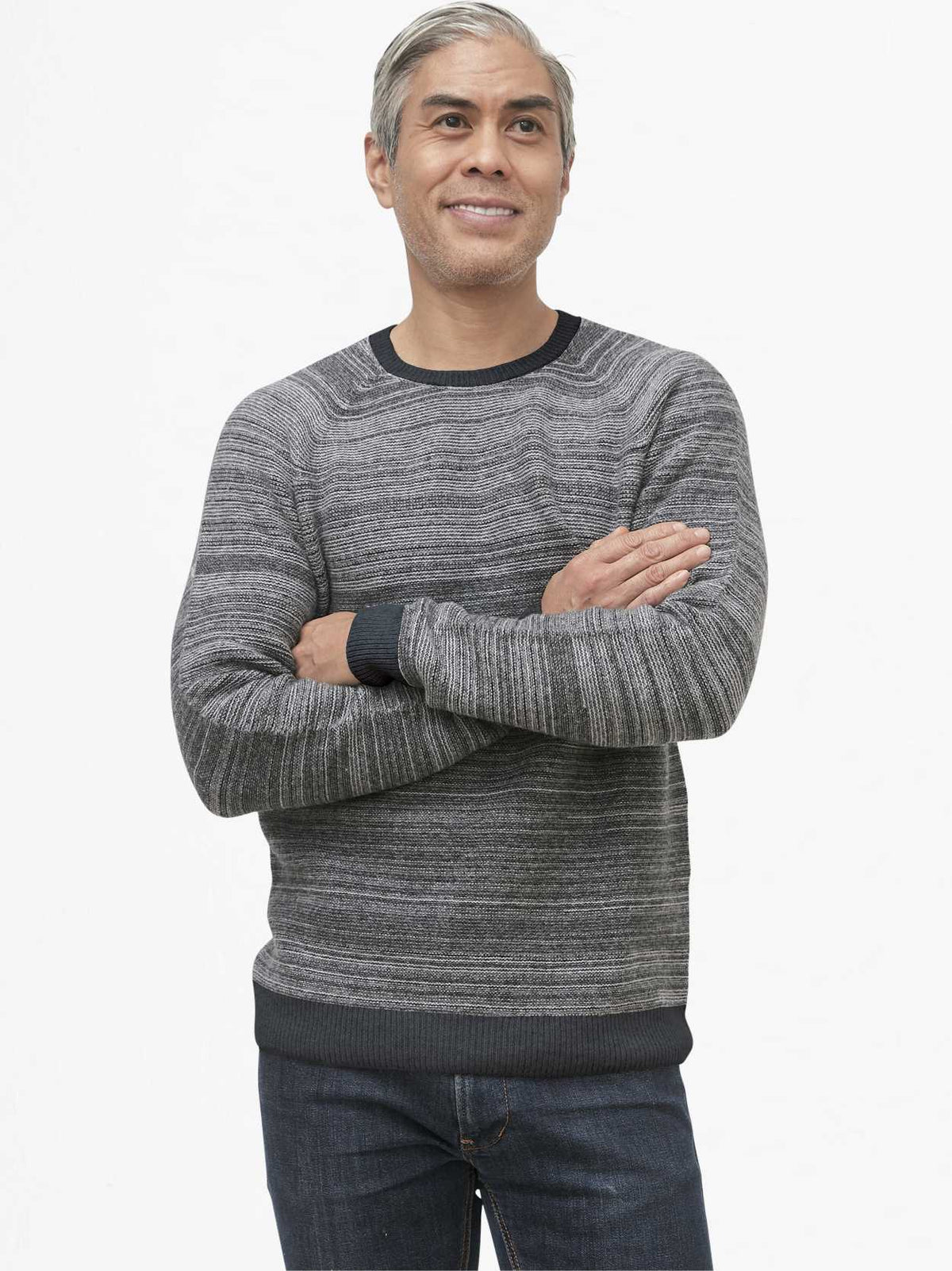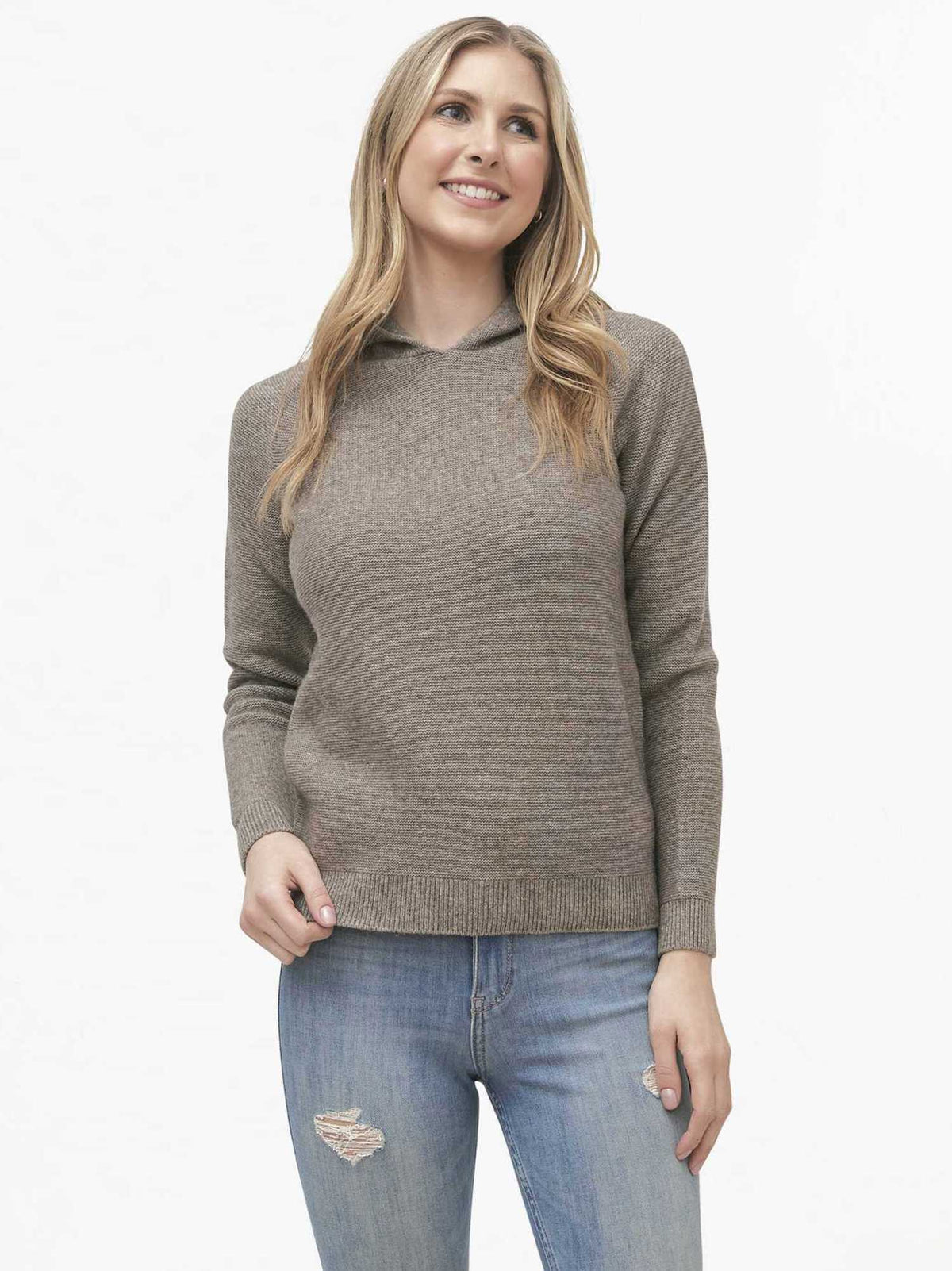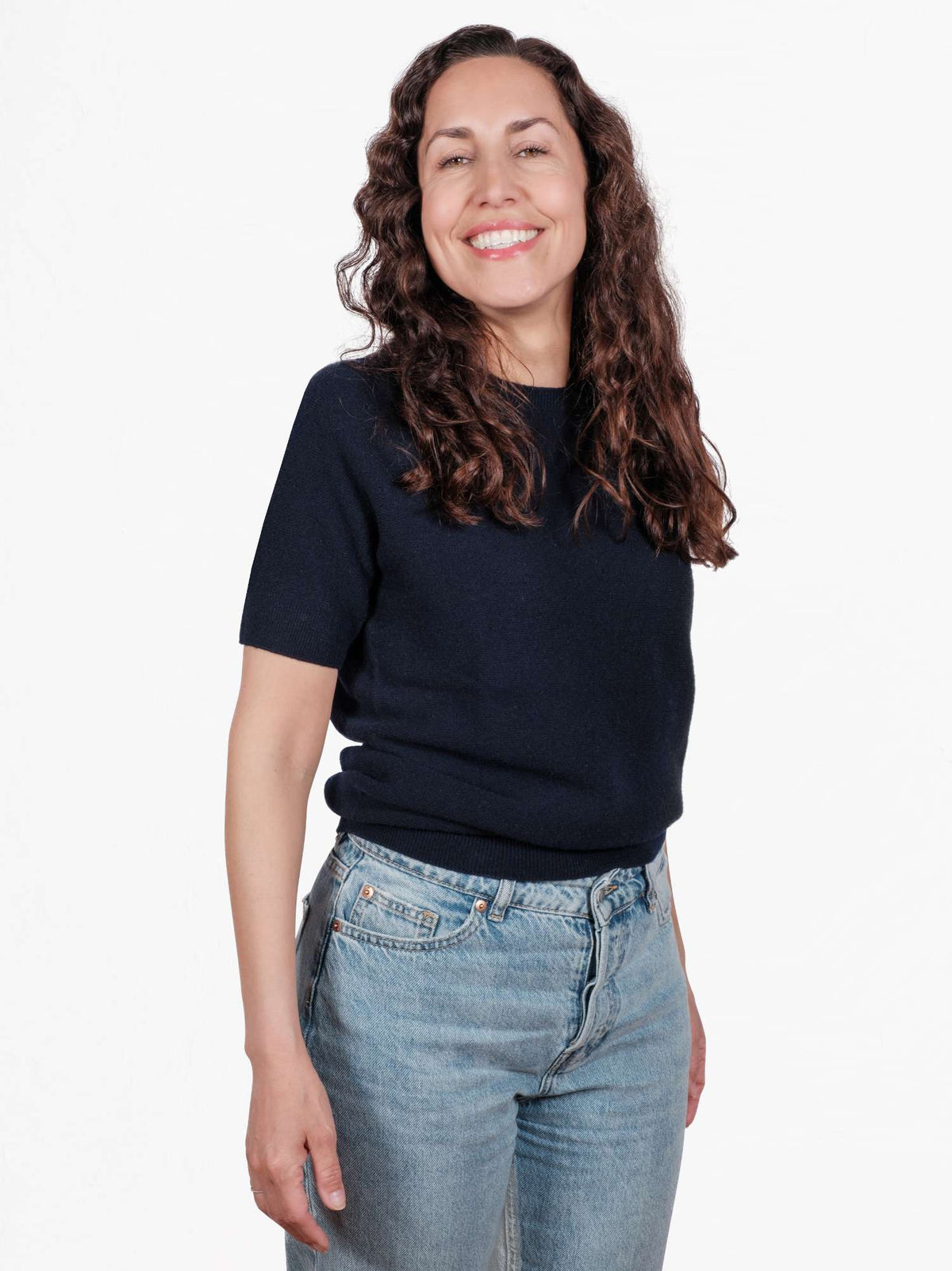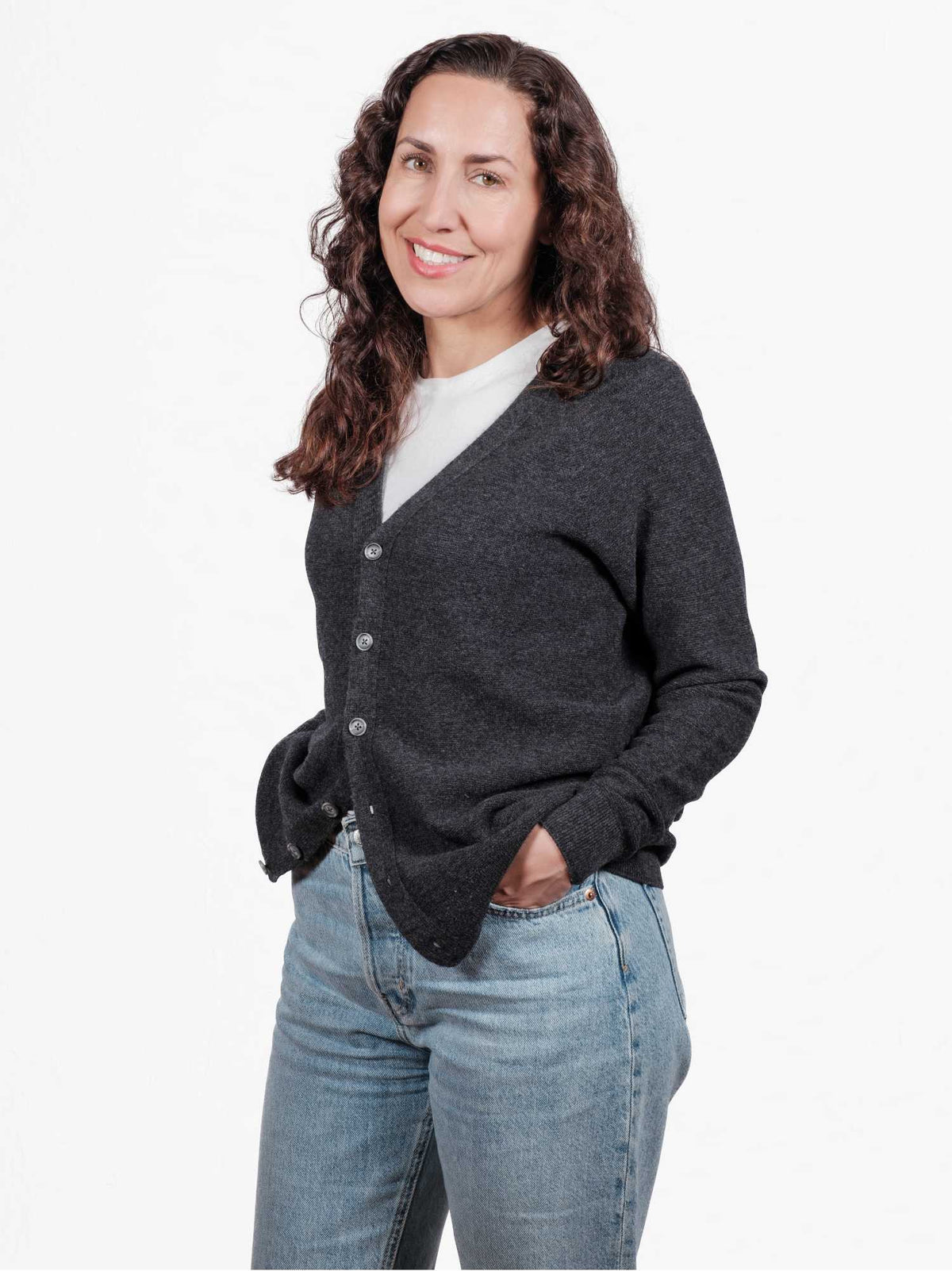Merino Wool: The Ultimate Guide

























Merino Wool, What's So Special About It?
Ideal for #repeat wear because of its comfort, durability, and antimicrobial properties.
Odor-Resistant
Wear all the time. Our materials don't trap odor.

Machine Washable
Easy to care for, while rarely needing a wash.

Soft
Our materials are similar in hand-feel to cashmere.
Breathable
Crimped fibers wick sweat and control body heat.
Insulating
Merino sheep live a range of 5-95°F, no problem.
Sustainable
Far better for the planet than synthetics.

100% American-Made Merino Sweater
We've looked far and wide, searching every nook and cranny of this big, beautiful globe for the perfect sweater materials.
We discovered yak wool nestled in the bussum of the Himalayas. We fished out SeaCell from the frosty waters of the Icelandic fjords.
Turns out what we were looking for has been sheepishly grazing right in our backyard the whole time. When it comes to the perfect sweater material that just so happens to be exceptionally sustainable, 100% US merino wool is hard to beat.
Learn more about our US Merino Crew Neck. 100% of the ultra-fine merino comes from the USA. We're working with 7 family ranches. Each has been tending merino sheep for more than 100 years.
It's the only fully traceable certified merino in America. It's also the same merino that went into several iconic Olympics Team USA sweaters. Like our other products, this sweater is USA-made, 3D-knit in Brooklyn, NY.
Field Test Our Best Selling Merino Blend All-Season Sweater
Challenge yourself and our sweaters. Wear our sweater for 1 week, give feedback, and it's free.

Where Does Oliver Charles Merino Come From?
We've managed to source an extraordinary type of merino wool from a collective of 7 ranches in California, Nevada, Oregon, and Colorado. Each ranch has its own unique history, more vibrant than the land the sheep graze to this very day.
This collective of ranchers is called Shaniko. Led by Jeanne Carver, from the Imperial Wool Ranch, Located in Shaniko Oregan, the once wool capital of the world. It was the first ranch in the US to get the coveted Responsible Wool Standard certification (RWS).
For the Ranchers that make up the Shaniko collective, sustainability is a way of life and necessary to ensure the future of the soil, water, grasslands, and grazing animals vital to its health.
In 2022, Jeanne and the Shaniko group achieved another milestone when they announced they were now NATIVA Regen certified. With a double NATIVA Regen + RWS certification, the Shaniko wool is North America's only traceable and 100% transparent wool.
Every single aspect of the yarn that goes into our 100% American-Made Merino Sweaters is done in the US, from spinning to dying to knitting. These sweaters are genuinely American-made. Shaniko Wool is only used in our 100% American-Made Merino Sweaters line. Our other merino wool products are RWS-certified and grown in Australia.


What Exactly Is Merino Wool?
Merino wool comes from an extraordinary kind of sheep that originated in Spain but is today ranched mainly in Australia, New Zealand, and South Africa. The merino sheep is so prized because its enormously thick and fluffy jacket of wool is comprised of particularly fine fibers of unusual quality.
To give context to that fineness, consider that the average human hair is around 40–50 microns thick. In contrast, merino wool fibers can be less than 17.5 microns, making them ideal for decadently soft and flexible fabrics.
After shearing, merino wool is cleaned and spun into yarn. The fibers go through 1 of 2 spinning processes worsted or woolen. Worsted spinning produces long fibers for making suits, sweaters, or shirts. Woolen spinning produces fluffy yarns suitable for blankets, wovens, and hand knitting.
Field Test Our Best Selling Merino Blend All-Season Sweater
Challenge yourself and our sweaters. Wear our sweater for 1 week, give feedback, and it's free.

Merino Sheep 101
The history of the merino sheep dates back to the 11th century when they were first bred in the Iberian Peninsula (which includes modern-day Spain and Portugal). The breed was initially developed for its fine, high-quality wool, which was highly prized for its softness and durability.
The merino sheep were introduced to Australia in the late 18th century and quickly became one of the most important sheep breeds in the country. In the 19th and early 20th centuries, merino wool was a major export for Australia, and the country became known for producing some of the finest wool in the world. Today, merino sheep are still widely raised in Australia and other parts of the world.


Where Does The Best Merino Wool Come From?
Merino wool is a highly sought-after material known for its exceptional quality and versatility. There are 3 main countries that are well known for producing high-quality merino wool: Australia, New Zealand, and South Africa.
Australia is a leading producer of merino wool, with the states of New South Wales, Victoria, and South Australia being particularly renowned for producing soft, fine-fibered wool.
New Zealand is another major producer of merino wool, known for its soft, high-quality wool. Most of the country's production comes from the South Island, where the breed is raised in large numbers. South Africa is also a significant producer of merino wool, with the breed being raised in many parts of the country. South African merino wool is known for its broader thickness, which gives it added strength.
Ultimately, the best type of merino wool for you will depend on your personal preferences and the specific qualities you are looking for in a wool product. Some people may prefer the softness and fine fibers of Australian or New Zealand merino wool, while others may prefer the durability of South African merino wool.
Our Merino Wool Sweaters
See more ➡

How Is Merino Wool Harvested?
Merino wool is a high-quality fiber obtained from the fleece of Merino sheep. The process of obtaining this fiber is known as shearing, which involves the careful and precise cutting of the wool fibers from the sheep's body using specialized trimmers.
Shearing frequency can be influenced by various environmental factors. Merino sheep have been domesticated for several decades, resulting in their loss of the ability to naturally shed their wool fleeces. Hence, these sheep now rely on humans to perform shearing to prevent their coats from becoming excessively heavy and hot.
Before the shearing process, the sheep are usually groomed and cleaned to obtain a clean cut of the wool fibers. Skilled workers known as shearers, who are trained to remove the wool, perform this task. In larger operations, mechanical shears may be utilized, however, manual shearing is more common. After harvesting, the wool undergoes cleaning and processing to remove dirt, debris, and contaminants. The resulting fiber is sorted and graded based on fiber diameter, length, and color.
Our merino wool sweaters feature a long staple length and fine diameter, making them resistant to pilling and incredibly soft to the touch, similar to cashmere.


Is Merino Wool Ethical?
The ethics of merino wool production depend on the method of raising sheep, harvesting wool, and processing it. Merino wool is generally considered an ethical choice for fiber due to the regulations regarding sheep welfare. Merino sheep are often raised in a humane manner with proper nutrition, shelter, and veterinary care.
However, not all merino wool is the same and there are concerns regarding the ethics of certain practices in merino wool production. One such practice is mulesing, the surgical removal of skin around the tail and hindquarters of the sheep to prevent flystrike, a condition caused by flies laying eggs on the sheep's skin which results in infection and death. Mulesing has been criticized as an inhumane and painful practice.
To address these concerns, wool producers and industry organizations have established codes of practice and standards for the humane treatment of sheep, including guidelines for mulesing. Some producers have also adopted alternative methods such as breeding for fly-resistant genetics or using chemical treatments to prevent flystrike.
To ensure that merino wool is ethically sourced, it is advisable to look for the Responsible Wool Standard (RWS) certification. While not perfect, RWS prohibits mulesing, and it the best standard for finding ethically produced merino. All Oliver Charles yarn is RWS certified.
Field Test Our Best Selling Merino Blend All-Season Sweater
Challenge yourself and our sweaters. Wear our sweater for 1 week, give feedback, and it's free.


How Sustainable Is Merino Wool?
Today, a significant portion of the clothing is made from highly processed and synthetic fibers. This poses a major environmental concern as these fibers are derived from petroleum and often end up as microfiber pollution in our food and water systems. Upon washing, each synthetic garment releases 2,000 microplastic fibers.
In contrast, the production of merino wool is sustainable and requires natural resources such as grass, water, air, and sunshine. Merino sheep grow amazing renewable fiber very quickly, creating a brand-new fleece every year, sometimes twice a year.
Most importantly, merino is fully biodegradable, so there's no need to worry about harmful microplastics infiltrating our food and water systems.
What Are Merino Wool's Properties/Benefits
Merino wool has been a sought-after fiber for centuries, and it's easy to see why. It's almost like a high-tech gadget that a team of NASA engineers meticulously invented. But in this case, it's all thanks to mother nature! Merino wool offers a dizzying array of impressive qualities.
- Thermoregulation: Merino wool fibers, much like their famous yak wool counterparts, boast an awe-inspiring crimped or coiled structure. This results in the creation of miniature pockets of air that work wonders in providing insulation. Believe it or not, pound for pound, it is considered to be one of the warmest fibers on the planet. And what's more captivating, this insulating effect works both ways, regulating temperature with effortless ease. It traps a natural layer of air, forming an impenetrable barrier against the external temperatures. Simply put, a sweater made of merino wool will keep you cozy in the chilly winter and cool in the scorching summer. How perfect!
- Moisture-Wicking: The crimps in merino wool fibers not only provide insulation, but they also give the wool moisture-wicking properties. The air pockets in the fiber create a pressure imbalance that pulls moisture away from the skin, keeping the wearer dry and comfortable. This makes sweaters made from merino wool highly breathable and a wonderful choice for those who desire comfort and functionality in their clothing. The beauty of merino wool lies in its ability to regulate temperature and moisture, making it truly a remarkable fiber.
- Antimicrobial: And, if all of these outstanding features of merino wool weren't enough, its moisture-wicking properties are also the key to one of its most beloved qualities. This moisture-wicking mechanism not only keeps you dry, but it also acts as a natural deterrent to odor-causing bacteria. This makes merino wool extremely antimicrobial, making it a strong rival to its Himalayan cousin, Yak Wool. In conclusion, merino wool is a truly remarkable fiber that offers insulation, temperature regulation, breathability, and odor resistance. It's the perfect choice for anyone looking for versatility, comfort, and functionality in their clothing.
- Durability: Merino wool is supremely durable, which means you can enjoy its benefits for a long time. Its high elasticity allows it to retain its shape while providing maximum comfort. This strength and elasticity have paved the way for the development of a wide range of products, from cozy sweaters to comfortable leggings, from warm socks to supportive shoes, and even underwear. With merino wool, you can enjoy the comfort, versatility, and performance of these products for a longer time, making it an excellent investment for your wardrobe.
- Protection: Merino is exceptionally lightweight, making it comfortable to wear without adding bulk. Its non-static properties mean you won't have to worry about those pesky clingy clothes. And, as a bonus, it's naturally UV resistant, providing protection from harmful sun rays. This type of wool has a high water and nitrogen content, and its natural lanolin content even makes it fire-resistant. With all these benefits combined, merino wool is not just a luxurious fiber but a smart choice for anyone who wants comfort, functionality, and protection in their clothing.
How Does Merino Wool Compare To Others?
How does merino stack up against other materials such as yak wool, alpaca, cashmere, cotton, and other synthetics?
Scroll ➡
| Merino | Yak Wool | Alpaca | Cashmere | Cotton | Polyester | |
|---|---|---|---|---|---|---|
| Antimicrobial | ✅ | ✅ | ✅ | ✅ | ❌ | ❌ |
| Breathability | ✅ | ✅ | ✅ | ✅ | ✅ | ❌ |
| Thermoregulation | ✅ | ✅ | ✅ | ✅ | ❌ | ❌ |
| Moisture-Wicking | ✅ | ✅ | ✅ | ✅ | ❌ | ❌ |
| Durability | ✅ | ✅ | ✅ | ✅ | ✅ | ✅ |
| Sustainability | ✅ | ✅ | ✅ | ❌ | ❌ | ❌ |
- Merino Wool Vs Yak Wool: Merino wool and yak wool are both known for their ability to regulate temperature. Both fibers keep you warm by trapping air in their fibers, which creates insulation while keeping you cool by wicking moisture away from the skin. They are also both known for their durability, resistance to pilling, resistance to stretching, and shrinking. The two main differences between merino wool and yak wool are warmth and the absence of lanoline. Untreated merino has about 10-20x more lanolin. Yak Wool does not contain anywhere close to the amount of lanoline as merino, making it hypoallergenic and often more comfortable to wear against the skin. Yak wool is also considered warmer than merino wool due to the harsh natural environment of the yak.
- Merino Wool Vs Sheep Wool: They are both sheep wool! Comparatively, merino wool is finer and more flexible than traditional wool, so it doesn't cause that scratchy skin irritation that we so often associate with wool products.
- Merino Wool Vs Alpaca: Merino wool is a finer fiber than alpaca, which makes it softer and more comfortable to wear against the skin. Alpaca fiber is coarser and has a more textured feel compared to merino wool. Another difference is the insulation properties of the fibers. Merino wool is known for its ability to keep you warm in cold conditions by trapping air in its fibers. Alpaca fiber is said to be warmer, but it is not as effective as merino wool at insulating existing body heat. In terms of moisture-wicking ability, both fibers can absorb and wick moisture away from the skin to help regulate body temperature. However, alpaca fiber is generally considered to be more moisture-wicking than merino wool.
- Merino Wool Vs Cashmere: One of the main differences between merino wool and cashmere is the fiber diameter. Cashmere is a finer fiber than merino wool, making it softer and more luxurious. Both merino wool and cashmere are exceptionally warm. However, cashmere is generally considered lighter and more insulating than merino wool, making it a good choice for colder temperatures. Cashmere comes with several downsides, though. It's much more expensive due to the low yield from each goat. It's also far more delicate than merino wool and is prone to pilling and shrinkage. Finally, cashmere is not nearly as breathable, leading to overheating.
- Merino Wool Vs Cotton: Merino wool is considered higher performing due to its superior moisture-wicking, temperature regulation properties, and natural odor resistance. Merino wool can absorb and evaporate moisture, keeping you warm in cold weather and cool in warm weather. Cotton, on the other hand, retains moisture, is not particularly warm, and does not have natural odor resistance like wool. Merino wool is ideal for repeat wear. Cotton is more affordable and widely available but not as versatile.
- Merino Wool Vs Polyester: The main difference is the way the fibers feel against your skin. Merino wool is generally considered softer and more comfortable to wear than polyester, which can feel like plastic and stiff. In terms of moisture-wicking ability, merino wool is more effective at wicking moisture away from the skin than polyester. Synthetic fibers do not have the ability to regulate body temperature in the same way wool does. The inability to wick moisture also leads to excessive bacteria growth, which can cause a garment to smell after only a few hours of wear.

Fast Facts About Merino Wool
Have we piqued your curiosity? If so, here are a few intriguing facts about merino wool that will cement it within your list of wardrobe dependables:
- If you were to look at merino fibers under a microscope, you'd see that it looks like curly hair. This is what we mean when we say that the fibers have crimp! The air space between these fibers is called "loft."
- According to the New Zealand Merino Company, there are approximately 30 million merino sheep in New Zealand. This means there are about 6 times more sheep than people in New Zealand (Population 5.5 million)
- The freshly-sheared wood of a merino sheep is sometimes called "grease wool" because excess lanolin and oil still need to be washed away.
- Back in the Middle Ages, so prized was the merino sheep that it was illegal to export them from Spain by penalty of death!
- The world record for the most expensive merino sheep went to a ram sold in 1988 for AUD 450,000 in Adelaide, South Australia.













